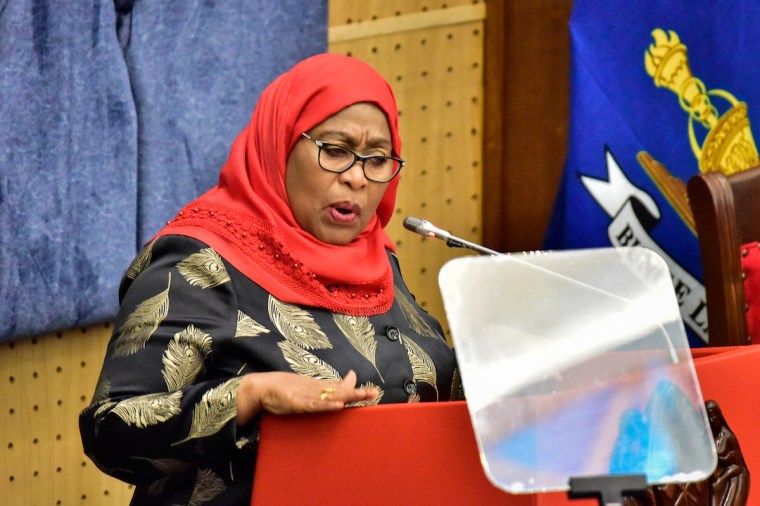On August 11, 2021, authorities in Tanzania issued a 14-day suspension of Uhuru, a newspaper owned by the Chama Cha Mapinduzi (CCM) ruling party, following allegations that the paper had published a false and seditious report about the country’s president, Samia Suluhu Hassan, according to media reports and a statement by government spokesperson, Gerson Msigwa.
Earlier that day, Uhuru had published a front-page story alleging that Hassan, who took office in March following the death of her predecessor, John Magufuli, did not intend to run for office during the next general election in 2025, according to the same media reports and a statement by the CCM.
The CCM disowned Uhuru’s reporting, claiming that the article was false and a mischaracterization of an August 9 interview Hassan gave to the BBC, according to the party’s statement and CCM Secretary General Daniel Chongolo, who spoke about the incident during a press conference on the morning of August 11.
In a video posted on Twitter on August 27, Uhuru Media Group, the newspaper’s parent company, said that the publication was back in circulation after 14 days and shared top headlines of that day’s newspaper. Edwin Soko, the chairperson of the Mwanza Press Club who spoke to CPJ via telephone on September 9, also confirmed that the paper was in circulation.
CPJ was not able to get through to anyone at Uhuru when trying to call phone numbers listed on its website and Facebook page in early September. The publication also did not respond to an email, a message sent via Facebook, or a message submitted through an automated form on the outlet’s website.
At the August 11 conference, Chongolo said that the newspaper’s board had suspended three senior managers at Uhuru pending investigation, and that he had directed the newspaper to cease publishing for seven days, according to a recording of the press conference posted on YouTube by private media outlets Mwanahalisi TV and Global TV.
However, Msigwa, a presidential appointee who is also the director of Tanzania’s Information Services Department, whose mandate includes licensing print media, issued a harsher 14-day suspension of Uhuru’s license, according to a statement posted on his Twitter account later that day. The suspension would take effect August 12, Msigwa said, adding that Uhuru could appeal to the Minister of Information if it wanted to contest the suspension.
In the statement, Msigwa said that in publishing the front-page story, Uhuru had breached professional standards and had violated sections of Tanzania’s Media Services Act. He accused the newspaper of violating sections of the law that allow for the imposition of hefty fines and prison terms for publications that include false information or have seditious intent.
Under the Media Services Act, first-time offenders convicted of publishing or distributing seditious publications may face up to five years in prison and/or fines of 10 million Tanzanian shillings (US$4,300). Anyone convicted of publishing “recklessly” or “fraudulently” fabricated information may face a prison term of up to five years and fines of up to 20 million Tanzanian shillings (US$8,600).
Uhuru is the first newspaper to be suspended in Tanzania in 2021, though the Media Services Act was weaponized to temporarily shutter several publications and to indefinitely revoke the license of at least one newspaper under the Magufuli presidency, according to CPJ’s past reporting and an August 11 statement by a local non-governmental organization, the Tanzania Human Rights Defenders Coalition (THRDC), reviewed by CPJ.
In 2019, the East African Court of Justice (EACJ), a regional body, directed Tanzania to amend the Media Services Act, finding that the law was inimical to press freedom and violated the Treaty for the Establishment of the East African Community, of which Tanzania is a founding member, as CPJ reported at the time.
In the August 11 statement, the THRDC urged the government to implement the 2019 EACJ ruling, saying that failure to do so was giving Tanzania a “bad image.” On August 27, the THRDC and two other local non-governmental organizations, Media Council of Tanzania (MCT) and the Legal and Human Rights Centre, filed a lawsuit against the government of Tanzania for contempt of court at the EACJ for its failure to amend the Media Services Act, according to a statement published on Facebook by the MCT.
CPJ emailed the EACJ for confirmation of the filing, but did not receive a response.
CPJ’s emails to the CCM, the Ministry of Information, and the Information Services Department requesting comment on the suspension of Uhuru, sent in late August and early September, went unanswered.
Msigwa did not answer his phone when CPJ called twice in early September, and also did not respond to a text message or WhatsApp message from CPJ requesting comment.
